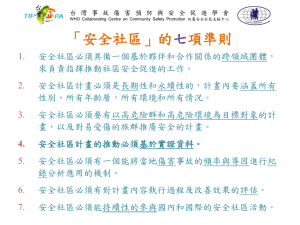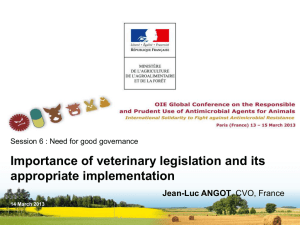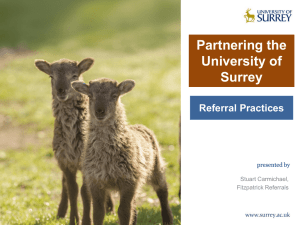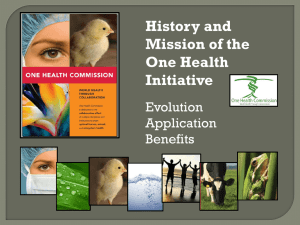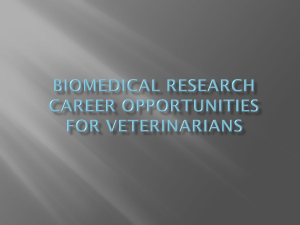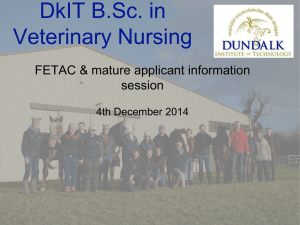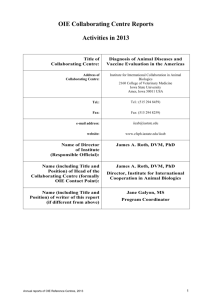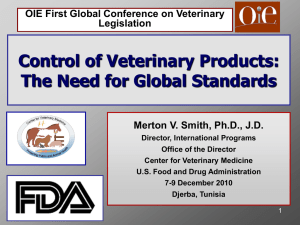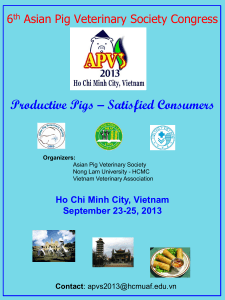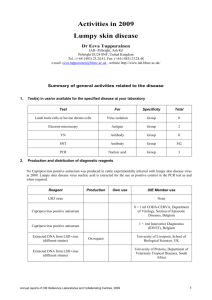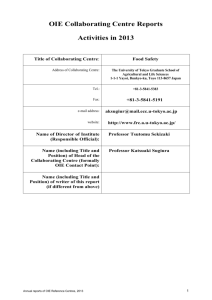THE ROLE OF OIE COLLABORATING CENTRES IN
advertisement
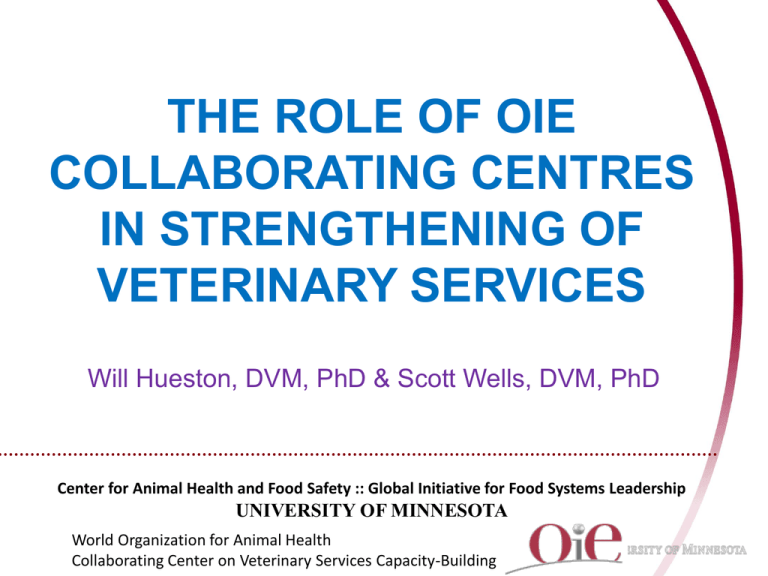
THE ROLE OF OIE COLLABORATING CENTRES IN STRENGTHENING OF VETERINARY SERVICES Will Hueston, DVM, PhD & Scott Wells, DVM, PhD Center for Animal Health and Food Safety :: Global Initiative for Food Systems Leadership UNIVERSITY OF MINNESOTA World Organization for Animal Health Collaborating Center on Veterinary Services Capacity-Building Overview • Evolution of OIE Collaborating Centres • Expanding role with PVS pathway • Relevance for Veterinary Education OIE Collaborating Centers: Born of necessity • Need for greater expertise and capacity • First Collaborating Centres early 1990s • Mandate & internal rules adopted 1993 Earliest Collaborating Centers (all still active) • 1991 Application of methodology for diagnosis of animal diseases especially for West Africa (Maisons-Alfort) • 1992 Immunoenzymatic and molecular diagnostic methods (IAEA) • 1992 Veterinary Medicinal Products (Fougeres) Collaborating Centres Mandate Techniques and specialties, eg, risk analysis Designation An institution TOR Analytical methods Data & information dissemination Services related to specialty Specialty training Reference Laboratories Designated pathogens or disease, eg, influenza An expert Diagnostic Methods Reference materials for quality assurance New diagnostic tests & vaccines Diagnostic training Evolution of Collaborating Centres • Initially individual government laboratories or institutes • Now includes – university institutes – partnerships among institutions – multi-national Collaborating Centres 43 OIE Collaborating Centres Region Americas Asia, Far East and Oceania Africa Europe Number of Centres* 15 9 4 16 Note: One multi-national Collaborating Centre spans 2 regions and is counted in both on this table Collaborating Centre Activities • • • • • • • • Dissemination of techniques within remit Facilitate harmonisation of int’l standards Networking Placement of experts at disposal of OIE Scientific and technical training Organisation of scientific meetings Coordination of scientific studies Publications and presentations Center for Animal Health and Food Safety The public health service unit of the College of Veterinary Medicine Education DVM-MPH Dual Degree Program • 124 currently enrolled • 77 completed program Vet Public Health Preventive Medicine Residency • 6 currently enrolled • 25 completed • Affiliate residencies – Makerere U, Uganda – Chiang Mai U, Thailand Experiential Learning • Leadership development • Policy-making • Farm to Table Study programs around the world • Workshops, conferences, and forums • 2008-2013: 52 programs delivered with 1,695 participants from 58 countries Impact - Education Jennifer Koeman VPHPM 2008-2010 National Pork Board Director: Producer and Public Health Nicole Neeser VPHPM 2002-2004 Minnesota Department of Agriculture Program Manager Dairy, Meat, Poultry and Egg Inspection Christine Hoang DVM 2007, MPH 2008 American Veterinary Medical Association Associate Director: Scientific Activities Division Barbara Knust VPHPM 2007-2009 Centers for Disease Control Viral Special Pathogens Branch Research CAHFS Service-Oriented Research Projects: • Risk Assessments to support emergency preparedness • Animal Health (Chronic wasting disease, Johne’s disease, others) • Food Safety (Antimicrobial use in pork production) Research Sponsors • National Center for Food Protection and Defense (DHS) • Upper Midwest Agricultural and Safety and Health Center (NIOSH) • RESPOND (USAID) • USDA Animal and Plant Health Inspection Service Pioneering Public-Private Partnerships Expanding Collaborating Centre Role with PVS Pathway • Veterinary Services is global public good • OIE emphasis on strengthening the performance of Veterinary Services worldwide • Opportunity for Collaborating Centres to support strengthening Expanding Role with PVS Pathway Twinning • Bilateral collaboration between established Reference Laboratory or Collaborating Center with another in developing country • Focus on capacity-building • Supported by OIE World Animal Health and Welfare Fund (the OIE World Fund) Relevance for Veterinary Education • Need to strengthen veterinary education identified in 95 PVS evaluations • Veterinary education critical for functioning of national Veterinary Services • OIE role in defining Day 1 competencies for Veterinary Graduates Launch of Veterinary Educational Twinning Projects • Parent institution accredited by international organization; candidate establishment in developing country • Guidance for training and curriculum development University of MinnesotaChiang Mai University Twinning Project • Built on strong pre-existing partnership – Curriculum enhancement to address priorities identified in curriculum review – Faculty development of teaching methods and encouragement of research – Veterinary student and graduate student exchanges to compare educational programs Strengthen Curriculum by Leveraging CC Resources www.cfsph.iastate.edu/ www.izs.it/IZS/ http://eraaad.ca/ • Printed materials, on-line coursework, videos, simulation exercises, training courses Key messages… • Collaborating Centres expand the OIE’s capacity to strengthen Veterinary Services • Veterinary education is critical to effective national veterinary services • Collaborating Centres can contribute to enhancement of veterinary education
